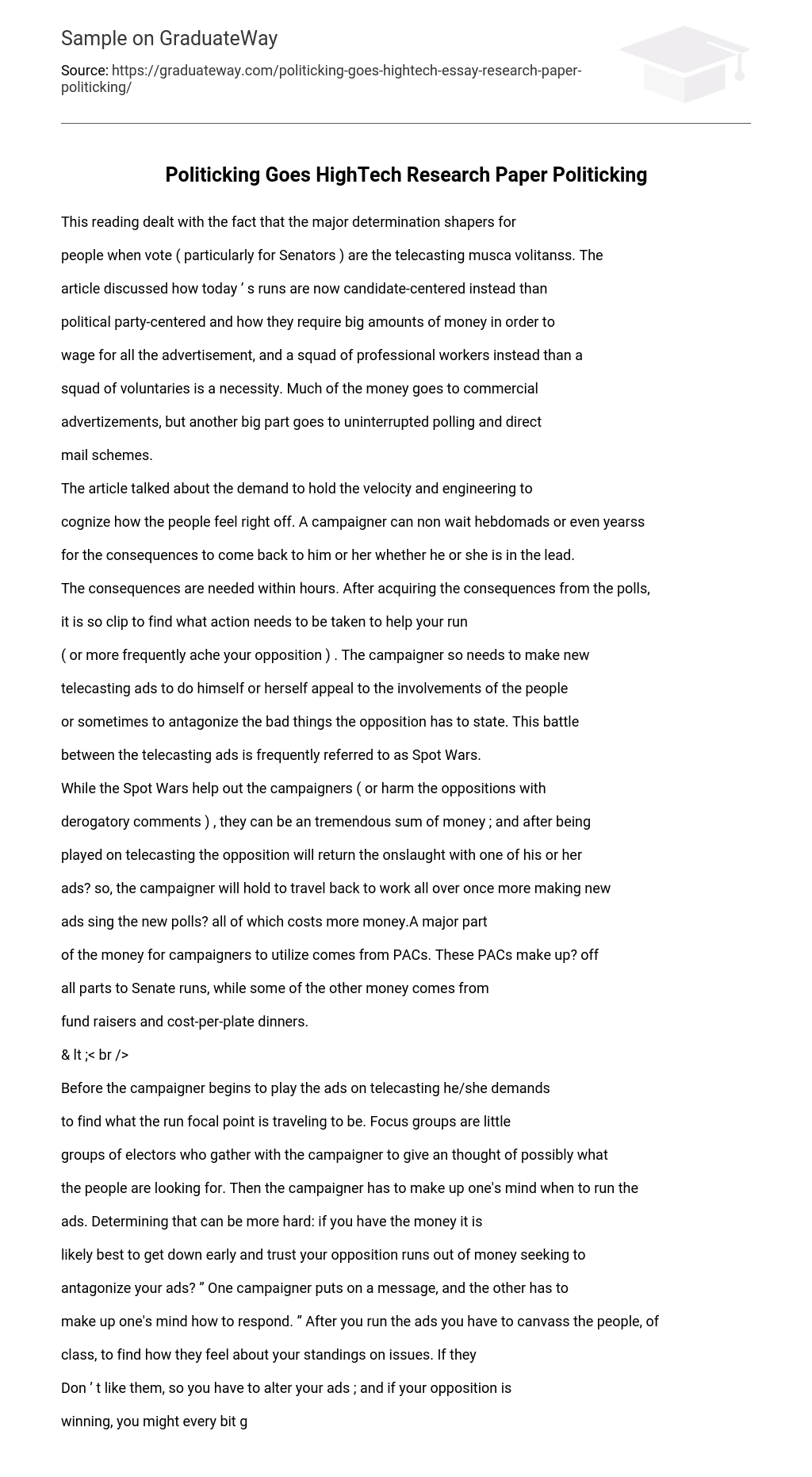This reading dealt with the fact that the major determination shapers for people when vote ( particularly for Senators ) are the telecasting musca volitanss. The article discussed how today ’ s runs are now candidate-centered instead than political party-centered and how they require big amounts of money in order to wage for all the advertisement, and a squad of professional workers instead than a squad of voluntaries is a necessity. Much of the money goes to commercial advertizements, but another big part goes to uninterrupted polling and direct mail schemes.
The article talked about the demand to hold the velocity and engineering to cognize how the people feel right off. A campaigner can non wait hebdomads or even yearss for the consequences to come back to him or her whether he or she is in the lead. The consequences are needed within hours. After acquiring the consequences from the polls, it is so clip to find what action needs to be taken to help your run ( or more frequently ache your opposition ) .
The campaigner so needs to make new telecasting ads to do himself or herself appeal to the involvements of the people or sometimes to antagonize the bad things the opposition has to state. This battle between the telecasting ads is frequently referred to as Spot Wars. While the Spot Wars help out the campaigners ( or harm the oppositions with derogatory comments ) , they can be an tremendous sum of money ; and after being played on telecasting the opposition will return the onslaught with one of his or her ads so, the campaigner will hold to travel back to work all over once more making new ads sing the new polls? all of which costs more money.A major part of the money for campaigners to utilize comes from PACs. These PACs make up? off all parts to Senate runs, while some of the other money comes from fund raisers and cost-per-plate dinners.
Before the campaigner begins to play the ads on telecasting he/she demands to find what the run focal point is traveling to be. Focus groups are little groups of electors who gather with the campaigner to give an thought of possibly what the people are looking for. Then the campaigner has to make up one’s mind when to run the ads.
Determining that can be more hard: if you have the money it is likely best to get down early and trust your opposition runs out of money seeking to antagonize your ads ” One campaigner puts on a message, and the other has to make up one’s mind how to respond. ” After you run the ads you have to canvass the people, of class, to find how they feel about your standings on issues.
If they Don ’ t like them, so you have to alter your ads ; and if your opposition is winning, you might every bit good state something about him/her to do him/her expression bad to the viewing audiences” negative ads ever cause a critical reaction at first, but are ” In merely a affair of seconds on a commercial, you can stain the life-long repute of your opposition if you so desire ; and the opposition will hold to run new ads to convey his/her repute back into good standing and so perchance tarnish yours.
Many times, nevertheless, a campaigner will overreact when a negative ad is thrown against him/her. “ They tend to believe the electors will turn against them. ” A negative ad does throw the campaigner off- guard and causes him/her to react and take up cherished clip and resources. I thought that this article was reasonably interesting in that the campaigners are able to react so rapidly to the telecasting ads and have new 1s made at the bead of a dime.
The article made me recognize how much “ socking ” goes on between the oppositions? they are ever stating bad things about each other. The sum of money that it takes to run the ads was talked about briefly, and it seems difficult to penetrate that the campaigners can come up with the money so easy.





